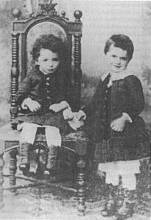
We have compiled the biography of Rudolf Steiner up to the year 1900. The
work will be completed in the near future. All quotes from Rudolf Steiner are
in italic.
Rudolf Joseph Lorenz Steiner was born in Kraljevec, an insignificant Hungarian
village in what is now Northern Croatia. So it came that he was born in a Slav
environment and not in a German-speaking one, a fact which he considered essential
for his life's work.
He was the first-born child of the railway telegrapher Johann Steiner and his
wife Franciska, Blie by maiden name.
He received Roman Catholic baptism two days later. This is why the 27th of February
1861 commonly has been considered to be his birthday.
It was mainly his mother, a quiet friendly woman, who looked after him in the
first years of his life.
His father was often doing a shift for three days and nights in a row, relieved
of his duties for 24 hours in a state of total exhaustion.
When Rudolf Steiner was 1½ years old, his father was transferred to Moedling near Vienna.
 |
| Rudolf Steiner (right) with his sister Leopoldine in the year 1867. |
Six month later, the father took up a position as station Manager in Pottschach
on the Semmerling line - which for those days was one of the technological most
advanced railways.
To the end of his life Rudolf Steiner looked at that period with joy and gratitude.
It was also in this period that Rudolf Steiner's sister Leopoldine (1864 - 1924)
and his brother Gustav (1866 - 1941) were born.
The scenes amidst which I passed my childhood were marvellous. The prospect
embraced the mountains linking Lower Austria with Styria.
I lived in this area from the age of two to the age of eight. The most beautiful
landscape embedded my childhood.
In contrast to this experience of nature stands the fact that the environment
in which he grew up was dominated by his father's employment. The family lived
in the station house, directly in front of the railway tracks.
My mother's sister who lived in some distance from our family home committed
suicide. Nobody knew about this at the time and my parents didn't have any message
about the tragic death. I saw in a vision the whole event whilst sitting in
the station's waiting room. Later I made some remarks when my parents were around.
Their reaction was to say: "You are a stupid boy".
Some days later I noticed when my father becoming very thoughtful whilst reading
a letter he had received. Another couple of days later he talked alone with
my mother. My mother cried for days after this conversation.
It was only some years later when I was informed about the tragic death of my aunt.
For the boy this was the beginning of a living in the soul.
I distinguished between things and beings "one can see" and such
"one can't see"
Rudolf Steiner was eight years old when his father was transferred to Neudoerfl
in Hungary, now part of Lower Austria. The family lived a isolated live troubled
by sorrow for his younger brother Gustav who turned out to be hearing-impaired,
dumb, and learning disabled.
It was only through long walks in the surrounding area that the young Rudolf Steiner got to know the inhabitants of the village. The Monks of a nearby monastery particularly fascinated him:
It was at the age of nine when the idea established in my mind that there must be important things I have to learn about in context of the tasks of these monks.
Rudolf Steiner's childhood was influenced by many unanswered questions he carried
within himself:
Yes, these questions about all kind of things made me a lonely boy.
He visited the village school in Neudorfle until 1972. He remained an outsider and never integrated in the class community: In autumn, everyone would just talk about who harvested how many nuts. The one with the biggest bounty would be the person with the highest status. I found myself at the bottom of this hierarchy. Being the 'foreigner in the village' I had no right to be part of this pecking order.
Guidance and help for Rudolf Steiner came through an assistant teacher at the school in Neudoerfl. It was not the man's outstanding teaching skills that were helpful; through this teacher Rudolf Steiner had access to a geometry book, which he was allowed to study in depth for many weeks:
As a child, I felt, without of course expressing it to myself clearly, that knowledge of the spiritual world is something to be grasped in the mind in the same way as geometrical concepts.
To understand concepts that are of a pure spiritual nature gave me inner contentment. I know it was through geometry when I experienced happiness for the first time.
Beside the assistant teacher it was the priest who made a lasting impression
on the 10-year-old boy.
Once he came to the school, gathered a group of the more mature students,
which I was considered to belong to, in his little study and explained the Copernican
system (…). I was completely taken in by the whole thing (....).
Through the station's telegraph I learned the theory, principles and laws of
electricity. Still a boy I learned how to use the telegraph machine.
Following this are the first studies of History, Literature and Mathematics.
October: pupil at the secondary modern school (Realschule) in Wiener - Neustadt.
Steiner perceives the orderliness and transparency in the scientific and mathematical
disciplines as invigorating in view of his first super sensible and childhood
clairvoyant experiences whose unfamiliarity triggered many questions.
Summer: Rudolf Steiner teaches himself shorthand.
Autumn: I gave extra lessons to fellow pupils… The College of Teachers
gladly supported this by sending me students since I was considered a 'good
pupil'.
Study of Kant's Critique of Pure Reason during mind-numbing history lessons.
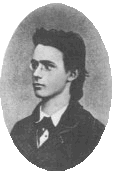 |
| Rudolf Steiner 1879 |
August: His father's transferred to Inzersdorf near Vienna to enable the 18-year-old
Steiner to study at the Polytechnic. Self study of Kant, Schelling, Hegel, Fichte,
Darwin and others. The study of Fichte inspires Steiner to first philosophical
essays.
October 1879: Begin of a study course of 8 Terms at the Polytechnic in Vienna,
financial support through a student grant. As bread study he decides
to aim for secondary school teacher. Nevertheless he visits a variety of philosophical
lectures.
At the time I felt obliged to find the truth through philosophy. Whilst most of the people in his environment regard philosophy as something abstract, for Steiner the spiritual world is a 'visible' reality. And this is how my view of the spiritual world was received in most places. No one wanted to hear about it.
History of physics, physics, chemistry, mechanics, geology, mineral logy, botany, mathematics, literature and history of literature, politics, zoology, medicine, philosophy are a selection of the of the areas Steiner chose to study. He passed the exams in these disciplines with excellence or distinction.
As a penny-less student coming from the country side Steiner found his way
into the life of Vienna only step by step and not in all areas. He had no access
to the circles of the aristocracy entrepreneurs, industrial workers or the world
of opera or big society events.
Rudolf Steiner fulfilled his until now unsatisfied thirst for pure music
that wants to be nothing but music by visiting concerts and chamber music.
Beethoven became his favoured composer, the deadly boring music Wagner's
resenting as barbaric.
He followed the political life by visiting public parliament sessions and he
also becomes member of a politically orientated student organisation.
The sad destiny of some of his fellow students showed him how the dominating
public spirit at the time caused strong feelings of hopelessness and pessimism
destroyed many lives. At the time all this could be experienced as the seed
that later in Austria lead to the crumbling of the empire.
Karl Julius Schroer, the professor lecturing German Literature, deeply honoured and admired by him, introduced Steiner in a very special way to the 'German Classic' generally and especially to Goethe. For all his life Steiner looked at Goethe as a great personality and idol for the people of his time.
In addition he was engaged with philosophical questions and increasingly with
questions regarding the theory of recognition, inspired by Fichte's research
regarding the relationship between spirit (I) and nature
(For me it was an immediate conception that the 'I' of a human being itself
is a spirit living within a world of spirits. Only nature did not seem to fit
in this world of the spirits).
Through his intensive work on Schelling's contemplations about the essence
of a human being, certainty grows within him regarding the ability, to see
the eternal within us in the form of the unchangeable (quotation by Schelling).
But: Cognition alone is not a matter of thinking and thoughts; a transition
to perception and nature needs to be found. Help in this inner struggle comes
from and unexpected direction through the herbalist Felix Koguzky who foresaw
the coming of another great personality. Steiner learned a lot from this
extraordinary man: When together with him one was enabled to have deep insights
in the secrets of nature.
He met his true spiritual teacher who's identity and role in society he keeps
a secret in the winter of 1881/82 at the age of 21.
The teacher's goal was to implement the regular things and the systems one
needs to know in the spiritual world. Eduard Schure to whom Steiner talked
about this encounter says: He quickly guided and passed him through the different
steps of inner discipline to elevate him to the level of a clairvoyance based
on conscious insight and reason. In just a few months of verbal instruction
the pupil became familiar with the unsurpassed depth and beauty of an esoteric
view.
Steiner reports about this time (he was 21):
A spiritual view appeared in front of my me that was not based on a dark
mystical emotions.
It rather was a spiritual activity fully comparable in it's clarity to the thinking
in mathematical terms.
I approached a condition of mind that gave me the certainty that I would be
able to justify the view of the spiritual world I carried within me in the light
of modern scientific thinking.
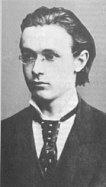 |
| Rudolf Steiner as a student in 1882 |
Autumn: Prof Joseph Kurschner invites Steiner on recommendation by Prof. Karl
Julius Schroer, to edit Goethe's scripts about natural science within 'German
National Literature' edited by Kurschner.
For Steiner this means the beginning of 1½ decades of Goethe research.
October: Steiner leaves the Polytechnic without final exam and without finishing
his studies despite having successfully past all intermediate examinations.
His hope was to lay the foundation for a career in literary studies with his
work about Goethe's natural science scripts. This hope was not fulfilled.
The literature experts positively acknowledge the First volume of Goethe's Scripts About Natural Science, first published in March.
April: On request Kurschner's Steiner agrees to edit articles in the field of mineralogy and later in general natural science in Kurschner's Conversation Dictionary.
June: Steiner is entrusted with the role of an educator in the household of
Ladislaus Specht. This is an important practical educational task that
becomes for Steiner a rich source of learning.
He becomes friend with the lady of the house, Pauline Specht. She becomes a
confidant with whom he can talk about all the things important to him.
His position gave him time to establish and maintain social contacts and to
pursue out his own work and studies.
Study of Eduard von Hartmann's and other philosopher's work.
Rudolf Steiner continues his studies and the editorial work on Goethe's Scripts
about Natural Science. Friendship with Radegunde and Walter Fehr.
By making the acquaintance with the poet Marie Eugenie Delle Gracie, a new circle of society opens up to Steiner. Some of the personalities he meets are lecturers of theology at the University of Vienna who recommended to Steiner to study the philosophies of Aristotle and Thomas of Aquinas.
April:
The book Baselines of a Theory of Knowledge of Goethe's Philosophy of life
is concluded. It already contains important basic ideas of Steiner's freedom
philosophy.
June: Steiner gladly accepts a position offered by the Director of the Goethe
Archive in Weimar.
By the beginning of the year severe illness forces Steiner to stop all his activities. The Specht Family however gives all the attention and love he needs for his recovery.
Since summer Steiner thoroughly concerns himself with the questions of aesthetics. He especially studies the philosophical aestheticians of the 19th century, under it Eduard von Hartmann with whom he gets in contact. (by letter).
The book Baselines of a Theory of Knowledge of Goethe's Philosophy of life
is praised in professional circles, but also criticised – in a fair
way –.
Autumn: The beginning of a friendship with Fritz Lemmermayer, who brings him
in contact with numerous poets.
Without neglecting the work he was engaged in previous years, Steiner becomes
the editor (informally) for the German Weekly Revue. This gives him the
opportunity to discuss publicly questions of politics, literature, philosophy
i.e. A review Steiner's of Robert Hamerling's Epos Homunculus, published
in the German Weekly Revue, rejected by the majority of readers as a grotesque
work of literature, causes astonishment within the Specht family, since the
statements regarding the position of Judaism, understood by Steiner in an objective
way, have been considered as a special kind of anti-Semitism. This
doesn't change his friendly relationship with the Specht family. Hamerling expresses
his gratitude for the understanding and the excellent article about 'Homunculus'.
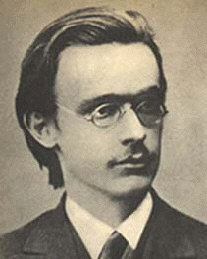 |
| Rudolf Steiner in the year 1889 |
In this year it is for the first time that Steiner undertakes extensive travelling. It is also his first journey to Germany. In spring he visits Budapest, Weimar in the summer. His work-schedule for the position at the Goethe-Archive is established during this visit to Weimar. He further travels to Berlin (meeting with Eduard von Hartmann), Stuttgart, Munich and Eisenach. At Christmas he visits Hermannstadt where he also gives some lectures.
For the first time he encounters Nietzsche's Work: 'Beyond Good and Evil' was the first of Nietzsche's books I read. I was at same time captivated and repelled by his views. I found it hard to relate to Nietzsche's way of thinking. I loved his style and courage; what I didn't like at all was the way he talked about the deepest problems without connecting himself with a conscious spiritual experience.
By the end of the year Steiner gets in contact with the Theosophists in Vienna. Although considering the time spent in this circle as valuable throughout, he doesn't really endorse the kind of Theosophy practised, which he characterises as a spiritual weakness that influences the spiritual development in a negative way. Soon afterwards he turns his back to Theosophy and Mystics in order to further his freedom philosophy. Later (1891) he mentioned the mystic element in which I submerged for a while in a disturbing way in Vienna.
At this time questions regarding the riddles of reincarnation take on a more tangible shape. I did struggle with the riddles of repeated lives of a human beings on earth. Some revelations came to me when having met personalities who's habits of live an characters revealed traces of an essence, entity that couldn't possibly be explained by their genetic inheritance and the way life experience has shaped them since they where born.
March: His acquaintance with the poet Rosa Mayreder leads to a deep friendship and a mutual understanding that allows exchanging his freedom philosophical thoughts and ideas. She shares some of his loneliness in which he fell (already at 1882) caused by the deviation of his views from the usual way of thinking. I had nobody at the time I could talk too about my views. Another source of redemption from his loneliness originates Goethe's work in which he finds his own thoughts expressed.
During the summer Steiner starts to work on his Thesis, later extended and published with the title Truth and Science.
September: Steiner moves to Weimar to commence work at the Goethe - Schiller Archive. Weimar will be his residence until 1897.
September: I received a warm welcome.
September 30th: Rudolf Steiner commences his work in the Goethe Archive.
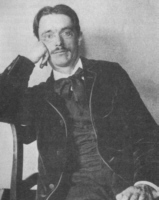 |
| Rudolf Steiner at the age of 30. |
First he appreciated the attractive side of his work: the discovery of new,
important or unknown facts. Already in April 1991 it says: The viewing,
sorting and classifying in the archive dulls my mind and causes a spiritual
discomfort, that almost destroyed any urge to write myself. He considers
his Goethe work as a skin, a shell that has become lifeless, and that
he wants to leave behind for once. Otherwise my whole existence
is going to become a lie and a nuisance: my work and my achievements will not
be my own anymore, but those of a miserable puppet.
In October, Steiner begins to work on the “Philosophy of Freedom”, his major philosophical work.
26th of October: Doctor Phil. officially awarded. His thesis, later extended and published under the title: ”Truth and Science”, considered by Steiner as the prelude for a “Philosophy of Freedom”, has the theme: “The basic question of the Science of Cognition in special consideration of Fichte’s Theory of Science”.
November: Steiner studies the philosophy of the middle age, the area in which
I considered my knowledge still to be incomplete. Once I feel confident here,
the gap between the profound knowledge I have about the ancient time and the
newer times will be closed, and only then I may claim to be on solid ground.
December: In a letter to Pauline Specht (Vienna), Steiner characterises the
mood caused by the circumstances as so powerful to cause him the feeling of
ongoing disgust. His working conditions might have contributed to this feeling
– the archive was limited to only a few rooms within the castle of Weimar,
and his superior was the pettiest of the pettiest……… a real
‘philister’ with the nature of a ‘schoolmaster’, incapable
of taking a wider point of view. – as well as his uncomfortable 2-bedroom
flat, und the fact, to have no one with an understanding I could talk with.
January: Today only thing left to say is, that my book (The Philosophy of Freedom) makes good progress. The disposition and the arrangement of the content are now determined. Besides his work in the archive, Steiner is also engaged as a writer. He often writes essays and reviews. Not seldom he criticises in his articles the preaching of moral that is done without any basis of knowledge. Because of this he made himself a number of enemies, but was supported by Ernst Haeckel. His moral views (ethical individualism) may be characterised by the following quotation: A general prescription from the big pharmacy of moral remedies can only be rejected by all those, who really work towards a better future.
At the same time he committed himself to edit the work of Schopenhauer and Jean-Paul for the publishing house Cotta.
By the middle of the year, Steiner moves to a flat at the place of Anna Eunike, soon a close friendship developed.
December: Steiner explains to Haeckel something that was also significant for all his later work: Since I am a writer, I am fighting against any dualism, and I consider it as a task of philosophy, to justify monism scientifically by means of a strictly positive analysis of our cognitive capacity, and also to proof, that all results gained by natural science are the real truth.
Whilst aiming for a teaching position in philosophy at the Polytechnical School
in Vienna with increasing enthusiasm, he continues with the previous’
years activities.
Also Steiner’s popularity as a lecturer grows also in other towns and
cities.
On the 15th of June, the election for the ‘Reichstag’ takes place, and the result mirrors the growing of anti-Semitism in the population. Steiner comments: I experience the increase in roughness and ignorance that has shown in the last election as really frightening.
After the completion and the publishing of his Philosophy of Freedom, Steiner asks many personalities under his friends and in the circle of professionals for their opinions and for reviews.
December: It is now more than three years since I arrived in Weimar, and in the three summers so much strain was laid on me, not allowing me even two weeks to relax without having to work.